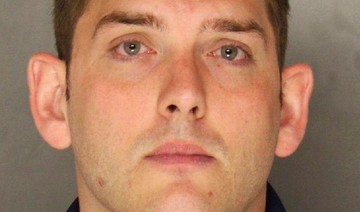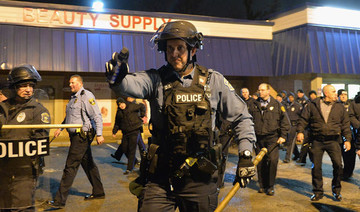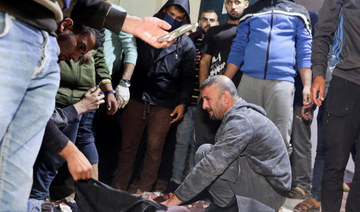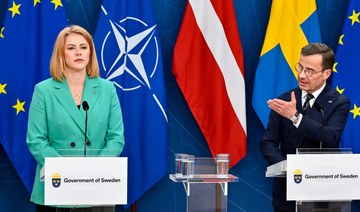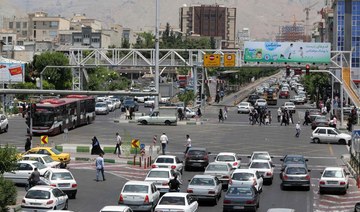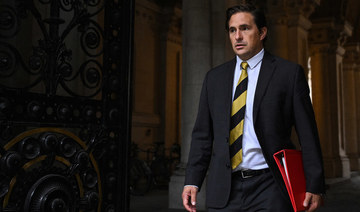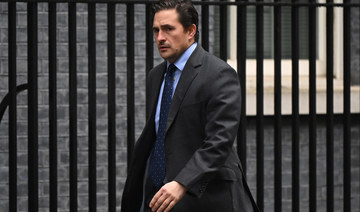CHICAGO: The white Chicago officer who gunned down a black teenager in 2014 was sentenced Friday to nearly seven years in prison, ending an explosive case that arose from one of the nation’s most graphic dashcam videos and added fuel to debates about race and policing and law enforcement’s “code of silence.”
Jason Van Dyke was convicted last year of second-degree murder and 16 counts of aggravated battery — one for each bullet fired at Laquan McDonald. Attorneys on both sides agreed that if he behaves in prison, the 40-year-old could be released in less than three and a half years.
McDonald’s family lamented that the penalty was too light. His great uncle said the sentence reduced Laquan McDonald’s life to that of “a second-class citizen” and “suggests to us that there are no laws on the books for a black man that a white man is bound to honor.”
Moments earlier, Van Dyke acknowledged the teen’s death, telling the judge that “as a God-fearing man and father, I will have to live with this the rest of my life.”
The sentence was less than half of the penalty that had been sought by prosecutors, who asked for 18 to 20 years. But it went far beyond the request of defense attorneys, who argued that Van Dyke could be released on probation. The prison term was also a fraction of what Van Dyke could have faced had he been convicted of first-degree murder, which carried a mandatory minimum of 45 years in prison.
Judges typically rebuke defendants during sentencings, even for much lesser crimes, and they often explain why they imposed the sentence they did. But Judge Vincent Gaughan did neither in his brief comments from the bench.
Friday’s testimony came a day after a different judge acquitted three officers accused of lying about the shooting to protect Van Dyke, who was the first Chicago officer found guilty in an on-duty shooting in a half century and probably the first ever in the shooting of an African-American.
The lead defense attorney, Dan Herbert, said Van Dyke “truly felt great” after learning his sentence. “He was happy about the prospect of life ahead of him” and someday being reunited with his wife and two daughters.
The prosecutor who oversaw the case said he could live with the sentence.
“Our goal was to find the truth, present the truth and ask for justice. ... It was not revenge,” special prosecutor Joseph McMahon said.
The judge’s decision to deem the second-degree murder conviction the most serious crime — siding with the defense on that question — may also have spared Van Dyke a far longer term behind bars.
Had Gaughan sentenced Van Dyke on the 16 counts of aggravated battery, as prosecutors asked him to do, he could have faced decades in prison. Each aggravated battery count carried a mandatory minimum of six years, and the judge could have ordered those sentences to be served one after the other.
After the judge’s announcement, Van Dyke’s older daughter began crying and said “I want him home.”
The case triggered large street demonstrations when the video emerged, and authorities prepared for potential unrest in October, when the verdict came out. But there were no sign of protests following the sentence.
Activist William Calloway called the sentence “a slap in the face to us and a slap on the wrist” for Van Dyke.
The issue of race loomed over the case for more than four years, although it was rarely raised at trial. One of the only instances was during opening statements, when the special prosecutor told jurors that Van Dyke saw “a black boy walking down the street” who had “the audacity to ignore the police.”
On Friday, several black motorists testified that the officer used a racial slur and excessive force during traffic stops in the years before the shooting.
One of those witnesses, Vidale Joy, said Van Dyke used the slur after pulling him over in 2005 and at one point put a gun to Joy’s head. He said Van Dyke “looked infuriated” and seemed “out of his mind.” Under cross examination, Joy acknowledged that he did not allege Van Dyke used a slur in his first accounts of the stop.
Another witness, Ed Nance, struggled to maintain his composure as he looked across the room to identify Van Dyke. Testifying about a 2007 traffic stop, he said the officer cursed and slammed him on the car’s hood, grabbed him by the arms and pulled him to the squad car.
Van Dyke’s relatives tried to defend and humanize him, saying he’s a good father and not racist.
His wife said her biggest fear was that somebody would kill her husband in prison “for something he did as a police officer, something he was trained to do.”
She looked up over her shoulder and addressed the judge directly: “His life is over. Please, please. He has paid the price already ... I beg for the least amount of time.”
On Thursday, Cook County Judge Domenica Stephenson cleared former officer Joseph Walsh, former detective David March and officer Thomas Gaffney on charges of obstruction of justice, official misconduct and conspiracy.
Stephenson accepted the argument that jurors in the Van Dyke case rejected: that the video that sparked protests and a federal investigation of the police force was just one perspective of the events that unfolded on the South Side.
The judge said the video showed only one viewpoint of the confrontation between Van Dyke and the teen armed with a small knife. She found no indication the officers tried to hide evidence or made little effort to talk to witnesses. She singled out how they preserved the graphic video at the heart of the case.
The video showed Van Dyke opening fire within seconds of getting out of his police vehicle and continuing to shoot the 17-year-old while he was lying on the street. On the footage, the teen is seen collapsing in a heap after the first few shots. Bullets kept striking his body for 10 more seconds.
Police were responding to a report of a male who was breaking into trucks and stealing radios on the city’s South Side.
City Hall released the video to the public in November 2015 — 13 months after the shooting — and acted only because a judge ordered it to do so. The charges against Van Dyke were not announced until the day of the video’s release.
The case cost Van Dyke and the police superintendent their jobs and was widely seen as the reason the county’s top prosecutor was voted out of office. It was also thought to be a major factor in Mayor Rahm Emanuel’s decision not to seek a third term.
The accusations triggered a federal investigation of the police department that found Chicago officers routinely used excessive force and violated people’s rights, particularly minorities.
Chicago police officer who shot black teen sentenced to nearly 7 years
Chicago police officer who shot black teen sentenced to nearly 7 years
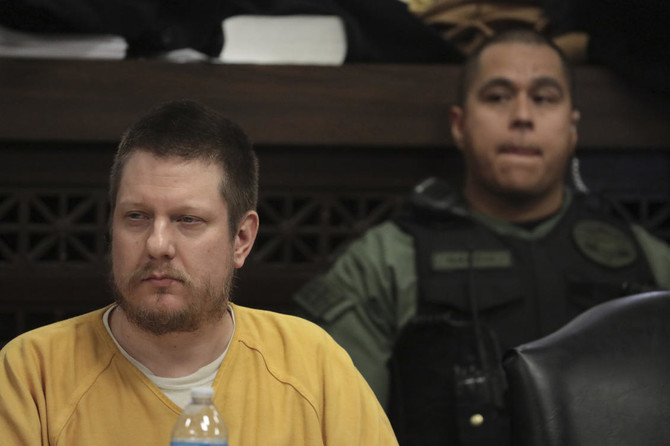
- Jason Van Dyke was convicted last year of second-degree murder and 16 counts of aggravated battery — one for each bullet fired at Laquan McDonald
- Van Dyke’s relatives tried to defend and humanize him, saying he’s a good father and not racist
UK’s foreign secretary supported arms sales to Israel days after British aid workers killed in Israeli strike
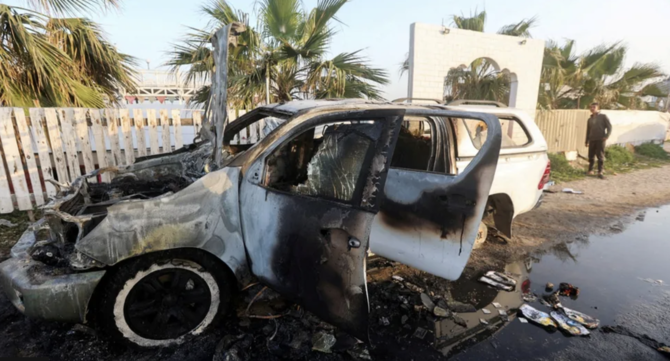
- Attack on World Central Kitchen convoy killed 7 people in total
LONDON: Britain’s foreign secretary recommended that the UK continue selling arms to Israel just days after an Israeli strike on a World Central Kitchen convoy killed three British aid workers.
David Cameron supported the continuation of arms sales two days after the strike on April 1, and the Secretary of State for Business and Trade Kemi Badenoch approved the decision on April 8, The Guardian reported on Thursday.
Cameron said earlier this week that the strike that killed the Britons, in addition to four aid workers of other nationalities, revealed systemic and personal failures by members of the Israel Defense Forces.
Cameron’s decision seems to have been based on an assessment of Israeli compliance with humanitarian law that did not cover the deaths of the aid workers due to a time lag in the government’s process for deciding if British arms exports were at risk of being used to commit war crimes.
There was a possibility that the business department’s assessment did not cover any incidents after Jan. 28.
An update on the handling of arms export licenses that took into consideration events up until the end of February was prepared, but the British Foreign Office has declined to say if that was included in the advice given to ministers.
Opposition Labour MPs claim the time delay means there is a possibility that no comprehensive ministerial-level assessment of Israel’s conduct of the war in Gaza has been made in the last three months.
Lawyers and campaigners who have examined the evidence provided by the Foreign Office have come to the same conclusion.
World Central Kitchen said on Monday it would resume operations in the Gaza Strip, a month after the Israeli airstrike.
Prior to halting operations, WCK had distributed more than 43 million meals in Gaza since October, representing by its own accounts 62 percent of all international nongovernmental aid.
NATO condemns Russian ‘malign activities’ on its territory

- The incidents “are part of an intensifying campaign of activities” Russia is carrying out across the Euro-Atlantic area
- NATO allies “express their deep concern over Russia’s hybrid actions, which constitute a threat to allied security“
BRUSSELS: NATO on Thursday condemned Russian “malign activities” on its territory, saying actions like disinformation, sabotage, violence and cyber interference threatened the alliance’s security.
The incidents “are part of an intensifying campaign of activities” Russia is carrying out across the Euro-Atlantic area and NATO allies “express their deep concern over Russia’s hybrid actions, which constitute a threat to allied security,” NATO said in a statement.
Authorities in the Czech Republic, Estonia, Germany, Latvia, Lithuania, Poland and Britain have recently investigated and charged people in connection with “hostile state activity.”
NATO said allies would work together to deter and defend against the hybrid actions and that they would remain steadfast in supporting Ukraine as it struggles to fend off Russia’s invasion, now in its third year.
Last month, a 20-year-old British man was charged with masterminding an arson plot against a Ukrainian-linked target in London. Moscow’s ambassador Andrey Kelin dismissed claims of links to Russia as “absurd” and “unfounded.”
In late March, Czech authorities said they had busted a Moscow-financed network that spread Russian propaganda and wielded influence across Europe, including in the European Parliament.
Israeli private eye arrested in UK over alleged hacking for US PR firm

- An initial attempt to extradite Amit Forlit to the United Sates was thrown out by a judge at Westminster Magistrates’ Court on Thursday
- Forlit was arrested under an Interpol red notice at London’s Heathrow Airport
LONDON: An Israeli private investigator wanted by the United States was arrested in London over allegations that he carried out a cyberespionage campaign on behalf of an unidentified American PR firm, a London court heard on Thursday.
An initial attempt to extradite Amit Forlit to the United Sates was thrown out by a judge at Westminster Magistrates’ Court on Thursday on a legal technicality.
Amy Labram, a lawyer representing the United States, had told the court that Forlit “is accused of engaging in a hack for hire scheme.”
Labram said that the US allegations include that an unnamed Washington-based PR and lobbying firm paid one of Forlit’s companies 16 million pounds ($20 million) “to gather intelligence relating to the Argentinian debt crisis.”
Forlit was arrested under an Interpol red notice at London’s Heathrow Airport as he was trying to board a flight to Israel, according to the USauthorities.
Forlit is wanted in the US on three charges: one count of conspiracy to commit computer hacking, one count of conspiracy to commit wire fraud and one count of wire fraud.
A judge ruled that the attempt to extradite Forlit by the United States could not continue as he was not produced at court within the timeframe required under British extradition law.
“He was not produced at court as soon as practicable and the consequences of that ... he must – I have no discretion – he must be discharged,” Judge Michael Snow ruled.
Forlit and his lawyer did not immediately return messages seeking comment. The Federal Bureau of Investigation did not immediately return a message.
Forlit has separately been accused of computer hacking in New York by aviation executive Farhad Azima. Azima, whose emails were stolen and used against him in a 2020 trial in London, is suing Forlit and others in federal court in Manhattan.
Forlit has previously acknowledged retrieving Azima’s emails but has denied hacking, telling Reuters he innocently stumbled across the messages “on the web.”
Death toll jumps to at least 48 as a search continues in southern China highway collapse
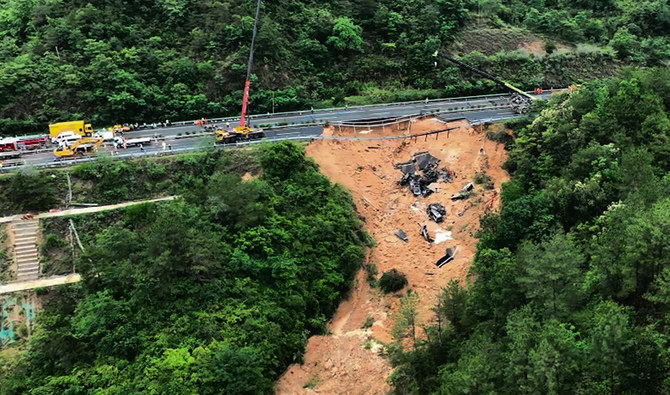
- One side of four-lane highway in Meizhou city gave way after a month of heavy rains
- Twenty-three vehicles fell down a steep slope, some sending up flames as they caught fire
BEIJING: The death toll from a collapsed highway in southeastern China climbed to 48 on Thursday as searchers dug for a second day through a treacherous and mountainous area.
One side of the four-lane highway in the city of Meizhou gave way about 2 a.m. on Wednesday after a month of heavy rains in Guangdong province. Twenty-three vehicles fell down a steep slope, some sending up flames as they caught fire. Construction cranes were used to lift out the burnt-out and mutilated vehicles.
Officials in Meizhou said three other people were unidentified, pending DNA testing. It wasn’t immediately clear if they had died, which would bring the death toll to 51. Another 30 people had non-life-threatening injuries.
The search was still ongoing, Meizhou city Mayor Wang Hui said at a late-afternoon news conference. No foreigners have been found among the victims, he said.
Search work has been hampered by rain and land and gravel sliding down the slope. The disaster left a curving earth-colored gash in the otherwise verdant forest landscape. Excavators dug out a wider area on the slope.
“Because some of the vehicles involved caught fire, the difficulty of the rescue operation has increased,” said Wen Yongdeng, the Communist Party secretary for the Meizhou emergency management bureau.
“Most of the vehicles were buried in soil during the collapse, with a large volume of soil covering them,” he said.
He added that the prolonged heavy rainfall has saturated soil in the area, “making it prone to secondary disasters during the rescue process.”
Over 56 centimeters (22 inches) of rain has fallen in the past four weeks in the county where the roadway collapsed, more than four times as much as last year. Some villages in Meizhou flooded in early April, and the city has seen more rain in recent days.
Parts of Guangdong province have seen record rains and flooding in the past two weeks, as well as hail. A tornado killed five people in Guangzhou, the provincial capital, during rain and hail storms last weekend.
The highway section collapsed on the first day of a five-day May Day holiday, when many Chinese are traveling at home and abroad.
Chinese leader Xi Jinping said that all of China’s regions should improve their monitoring and early warning measures and investigate any risks to ensure the safety of the public and social stability, state broadcaster CCTV said.
UK Veteran’s Minister Mercer to risk jail over Afghanistan inquiry
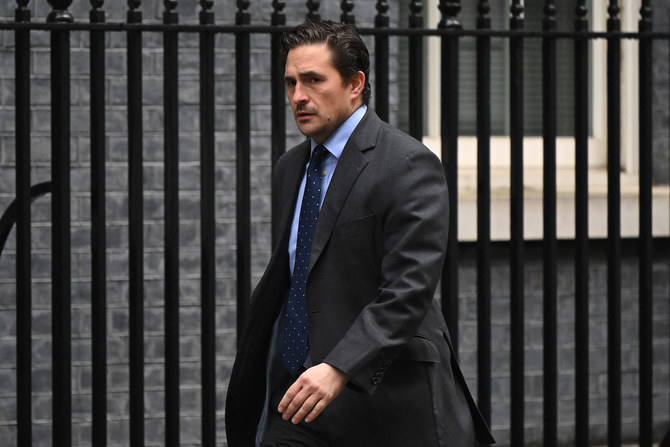
- Friends suggest minister will refuse to hand over identities of whistleblowers over fears for their well-being
- Mercer faces potential 52-week jail term, which would cost him his role as a minister and MP
LONDON: UK Veteran’s Minister Johnny Mercer will risk prison by not revealing the identities of whistleblowers to an inquiry investigating the killings of innocent people in Afghanistan.
The Times reported that friends of the MP had suggested he would rather be a “man of integrity” over the matter ahead of a deadline to hand the names to the inquiry, chaired by Lord Justice Haddon-Cave, next week.
Mercer has already given evidence to the inquiry, which is investigating allegations of extrajudicial killings and cover-ups by UK Special Forces between 2010 and 2013.
Appearing in February, he said a Special Forces soldier told him that in 2017 he was asked to carry a weapon to plant on an unarmed civilian to make them seem like an enemy combatant. He refused to reveal the source and others out of fear for their safety, with suggestions that some may be suffering from post-traumatic stress disorder and could be mentally vulnerable.
Haddon-Cave gave Mercer until April 5 to reveal the names, which was later extended. Failure to comply, he was warned, could result in a year-long prison term, which would cost him his job as a minister and his position as an MP. He could also face a fine.
One friend of the MP told The Times: “The inquiry doesn’t seem to realise that nothing will destroy their authority more than putting the veterans’ minister in the dock — the one man the military community trusts.
“If they do this, no one from the military community will want to co-operate with the inquiry. They seem to think Mercer will fold under the pressure and they will get their way. But he won’t. He will go down as a man of integrity and the inquiry will lose all support.”
Former Armed Forces Minister James Heappey said Mercer should reveal the identities of his sources.
“I admire Johnny enormously for the way that he has done politics under his own rules with an incredible sense of mission … He is a remarkable man but on this particular point I think for him, for his family and actually for the credibility of the inquiry I think he does need to disclose these names,” Heappey said.
On Friday, the inquiry will examine the Ministry of Defence’s failure to provide evidence to it on time. It is still waiting to hear from senior officials, including former Defence Secretary Ben Wallace.
It has also heard allegations that Gen. Gwen Jenkins, future national security advisor and former Special Boat Service head, locked away a report into claims of extrajudicial killings instead of passing it to military police.
Mercer also suggested during the inquiry, which began in December 2022, that the next head of the UK Army Lt. Gen. Sir Roly Walker had given “unbelievable” testimony over claims that Special Air Service personnel had killed unarmed Afghans.
An investigation by The Times, meanwhile, has suggested that former members of specialist Afghan Army units CF 333 and ATF 444 could provide crucial witness testimony to the inquiry but that their subsequent relocation from Afghanistan was overseen by MoD officials in a potential conflict of interest.
Many had their asylum claims to come to the UK rejected, a decision now under review.


